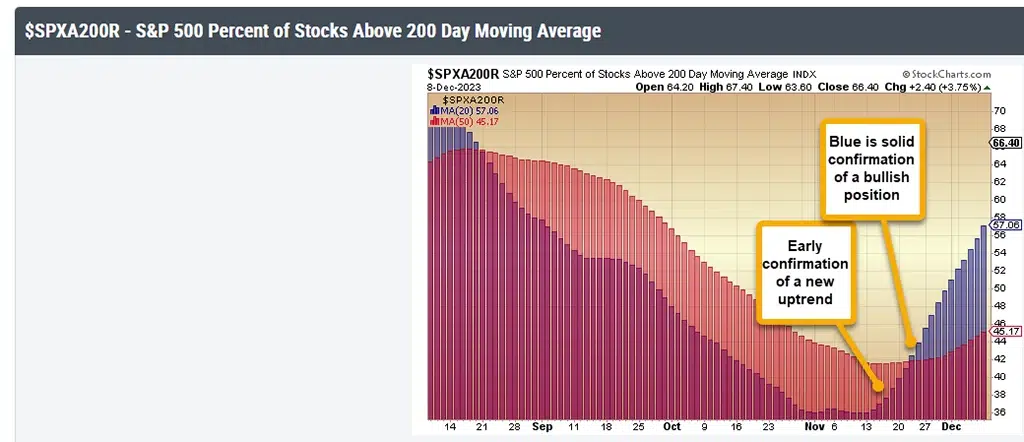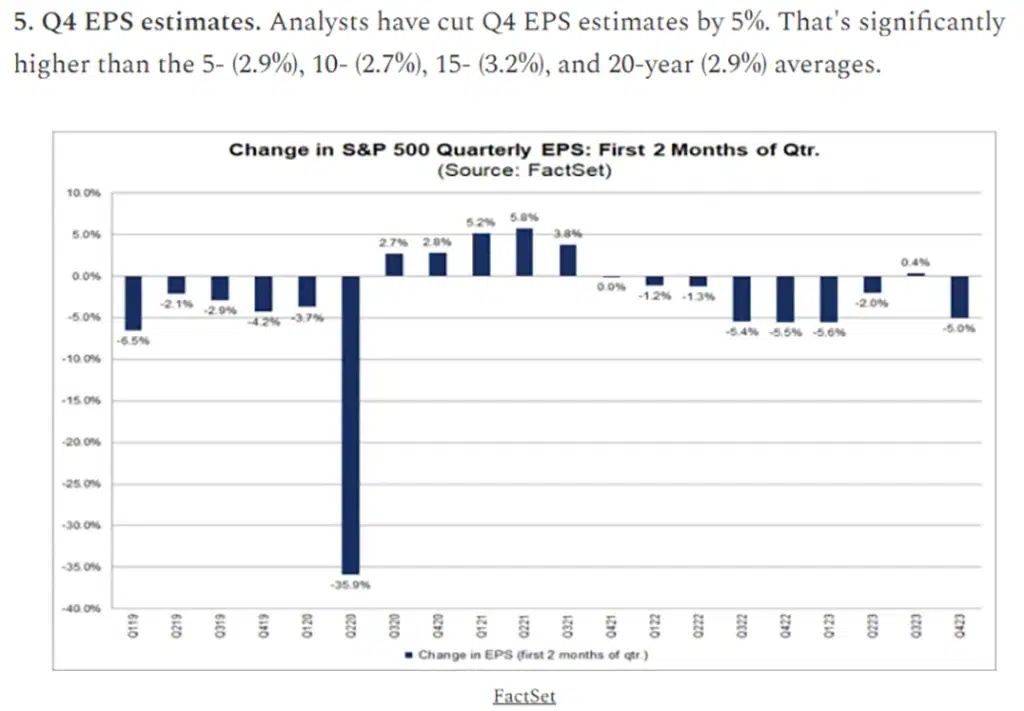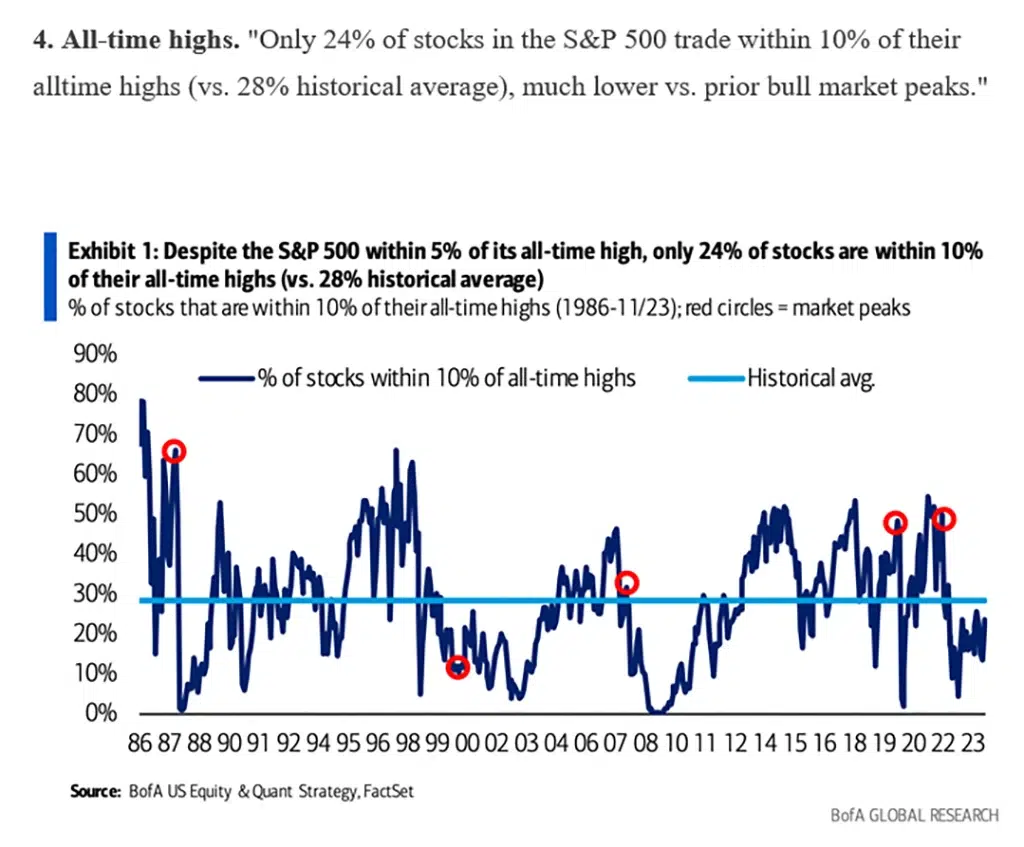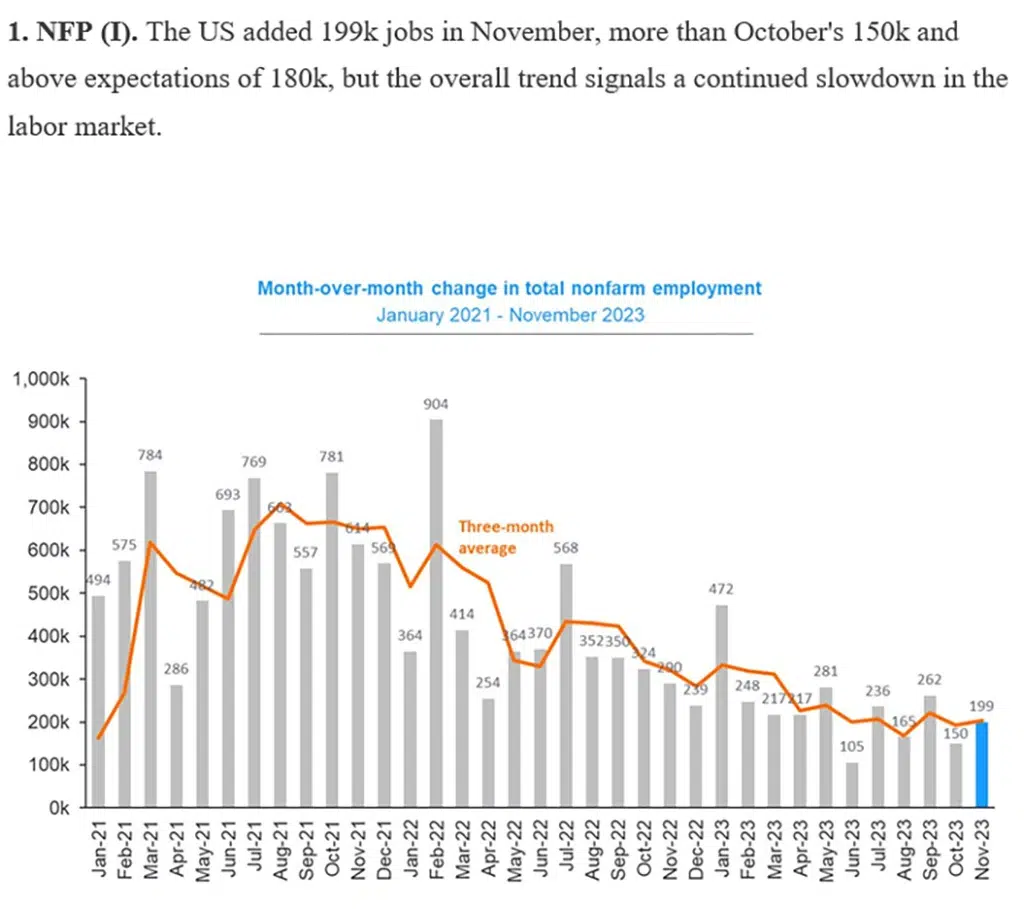December 13, 2023
Weekly Market Outlook
We want to illustrate below the longer term chart for just the S&P 500. It is rather easy to make the case that we are indeed in a period of upward market bias. Every day the number of S&P 500 companies that are above their 200-day moving average is increasing.

We consider this one of our longer term “safe” illustrations and indications of a positive or negative market environment. In late October we showed that the 20-day and 50-day charts had indicated a positive, bullish bias was approaching in the last week of October.
Subscribers (of Profit Navigator) are aware of that algo’s powerful and robust engine, and that indicated a positive signal (and to take a position in SPY or SSO (2x SPY)) towards the end of October. The signal was triggered a few days before the market turned at the end of October. (if you want more information about the Profit Navigator, please reach out to Rob Quinn, our Chief Strategy Consultant at Rob@MarketGauge.com).
It’s All About the Magnificent 7.
We continue to hear the narrative that it is all about the Magnificent 7’s overweight influence on the S&P 500. These 7 stocks, Alphabet, Apple, Amazon, Microsoft, Netflix, Nvidia and Tesla, do have a significant influence on the S&P 500 index (certainly as well with the NASDAQ 100-QQQ).
Most of these stocks are valued at or above $1 trillion in market cap so they are the biggest companies in America (Apple is now over $3 trillion in market value). Given that the S&P 500 index is a market cap influenced index it makes perfect sense that these 7 companies would comprise 30% or more of the S&P 500 index influence. For the purposes of this illustration, let’s look at the group as if it was ONE stock. These are some of the current characteristics that would make up this one stock:
- The stock (the average of the seven) is up a staggering 71% this year.
- It has an $11.7 trillion market cap, equal to half of the U.S. GDP (let that sink in).
- It trades at 33.1 times current (2023) earnings and 27.5 times forward (2024) earnings.
- Last quarter it reported earnings-per-share (“EPS”) growth of 51%, the best quarter of this current cycle.
- In the current quarter, EPS growth is expected to be 44%.
- These stocks gush free cash flow. They have so much cash on their balance sheets that they continue to buy back their stock and make each share more valuable.
- Apple alone is sitting on $180 billion in cash and cash equivalents.
- However, as the year-over-year comparisons get more and more difficult, EPS growth is expected to decelerate… to 30%, 14%, and a mere 8% over the next three quarters.
These 7 stocks have helped fuel the S&P 500 index’s 19% gain for 2023. Compare that to the equal weighted index (where each of the 500 companies have an equal 2% contribution to the index) which is up 6% year-to-date.
If you notice the last bullet point above, you will note that expectations are for these 7 stocks to begin to have earnings per share growth that begins to decelerate.
Would we recommend buying these 7 stocks now? Since we don’t make discretionary decisions and instead depend on our formulaic algorithms to do the heavy lifting, our likely answer is we would be CAUTIOUS. These stocks are priced for perfection. Momentum may carry them further but if you look at the analysis they are selling at very high P/E multiples at this time.
Looking at the most recent expectations for earnings growth (according to FactSet) for the markets (see below), you will notice that analysts are starting to reduce their forecasts for positive earnings growth. If EPS growth rates start to slow, it may very well have a greater impact on these 7 as they now sell for lofty valuations. This is also why some of these stocks have stalled recently while smaller companies, including those in the Russell 2000 small-cap index have begun to appreciate and gain momentum.

Don’t listen to all the narrative that it is ONLY these 7 stocks that are driving the market. This is not true and as our color chart above indicates, many, if not the majority of the stocks that make up the S&P 500 are currently participating in this year’s positive return. More importantly, many stocks that comprise the S&P 500 index are considered attractively priced and more favorably valued with plenty of room to appreciate further. See chart below:

How can you find these stocks?
You don’t need to. Through our various proprietary tools, scans and pre-built investment strategies as well as our MarketGauge Pro All-Weather portfolio blends, we will do this for you. Give us a chance. Whether you want to trade these ideas yourself or you want us to do it for you, give us the opportunity!
JOBS… For now, it looks like a soft landing.
Yesterday, November’s job report came out at 8:30 EST. This monthly release came out above expectations at 190,000 new jobs created. Unemployment dropped. These numbers were better than October’s 150,000 jobs and slightly better than the estimated 180,000 number expected. Job creation continues to show a positive albeit a slowing monthly number. It is the consistent slowing throughout 2023 that will likely prevent the Fed from raising rates further at their December meeting next week. See chart below:

For now, the country appears to be fully employed. People have high enough disposable incomes to pay bills, buy groceries, keep Amazon crazy busy daily, enjoy entertainment, and have enough left off to travel and keep the economy bustling.
A few weeks ago, the GDP print (positive) also beat expectations. However, since then certain parts of the economy have slowed enough that interest rates have fallen by over 70 bp on the 10-year Treasury (from 5% in October to 7.24% yesterday). Has the Fed engineered a soft landing? For now, it appears so.
In fact, many of the leading economists believe that the economy will avoid a recession so long as job creation and GDP stay positive, even if in low positive monthly changes.
There are other analysts, however, that believe we may be headed for a hard landing.
Click here to continue reading about:
- Will the economy avoid a hard landing?
- What are the expectations for when the Federal Reserve might pivot and begin to lower rates?
- Why are some Wall Street analysts concerned about Consumer Spending?
- Are consumers beginning to get “tapped out”?
- The complete weekly Market Outlook bullets














